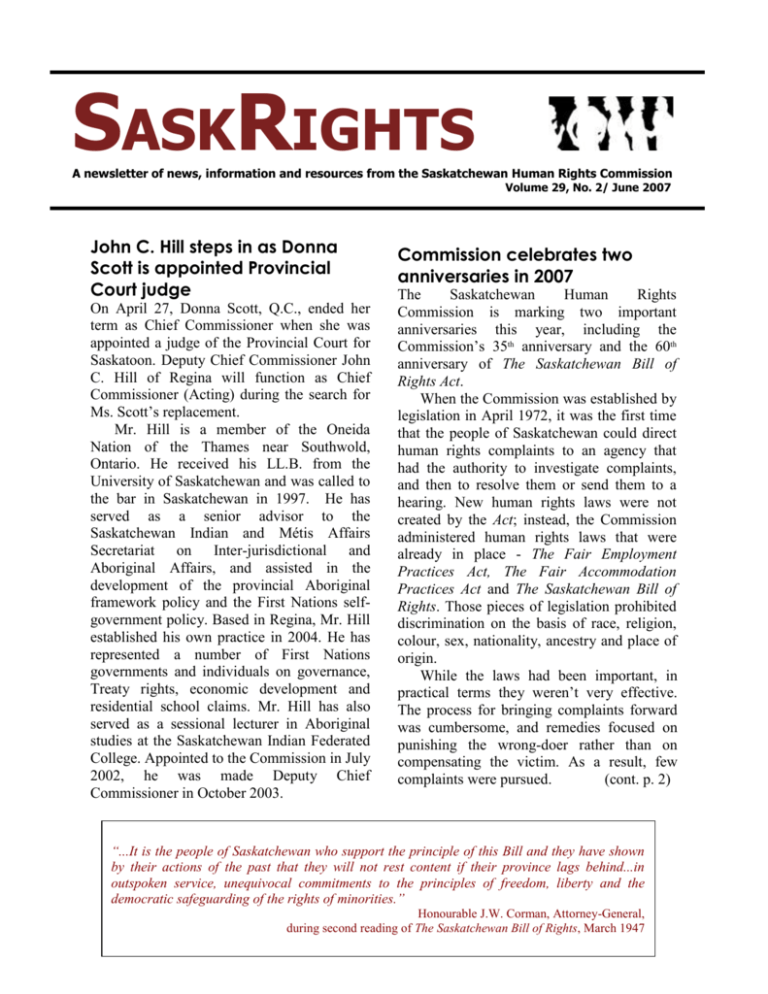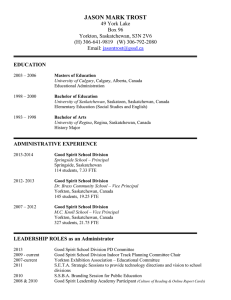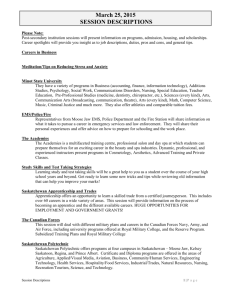Word document - Saskatchewan Human Rights Commission
advertisement

SASKRIGHTS V A newsletter of news, information and resources from the Saskatchewan Human Rights Commission Volume 29, No. 2/ June 2007 John C. Hill steps in as Donna Scott is appointed Provincial Court judge On April 27, Donna Scott, Q.C., ended her term as Chief Commissioner when she was appointed a judge of the Provincial Court for Saskatoon. Deputy Chief Commissioner John C. Hill of Regina will function as Chief Commissioner (Acting) during the search for Ms. Scott’s replacement. Mr. Hill is a member of the Oneida Nation of the Thames near Southwold, Ontario. He received his LL.B. from the University of Saskatchewan and was called to the bar in Saskatchewan in 1997. He has served as a senior advisor to the Saskatchewan Indian and Métis Affairs Secretariat on Inter-jurisdictional and Aboriginal Affairs, and assisted in the development of the provincial Aboriginal framework policy and the First Nations selfgovernment policy. Based in Regina, Mr. Hill established his own practice in 2004. He has represented a number of First Nations governments and individuals on governance, Treaty rights, economic development and residential school claims. Mr. Hill has also served as a sessional lecturer in Aboriginal studies at the Saskatchewan Indian Federated College. Appointed to the Commission in July 2002, he was made Deputy Chief Commissioner in October 2003. Commission celebrates two anniversaries in 2007 The Saskatchewan Human Rights Commission is marking two important anniversaries this year, including the Commission’s 35th anniversary and the 60th anniversary of The Saskatchewan Bill of Rights Act. When the Commission was established by legislation in April 1972, it was the first time that the people of Saskatchewan could direct human rights complaints to an agency that had the authority to investigate complaints, and then to resolve them or send them to a hearing. New human rights laws were not created by the Act; instead, the Commission administered human rights laws that were already in place - The Fair Employment Practices Act, The Fair Accommodation Practices Act and The Saskatchewan Bill of Rights. Those pieces of legislation prohibited discrimination on the basis of race, religion, colour, sex, nationality, ancestry and place of origin. While the laws had been important, in practical terms they weren’t very effective. The process for bringing complaints forward was cumbersome, and remedies focused on punishing the wrong-doer rather than on compensating the victim. As a result, few complaints were pursued. (cont. p. 2) “...It is the people of Saskatchewan who support the principle of this Bill and they have shown by their actions of the past that they will not rest content if their province lags behind...in outspoken service, unequivocal commitments to the principles of freedom, liberty and the democratic safeguarding of the rights of minorities.” Honourable J.W. Corman, Attorney-General, during second reading of The Saskatchewan Bill of Rights, March 1947 Anniversaries, from page 1 The new Commission, however, with its investigative powers, resulted in the agency receiving 690 complaints of discrimination in its first four years of operation. The legislation was also significant in its new emphasis on prevention. The new commission was to battle discrimination and to promote equality through research and education. The Commission opened its first office in Saskatoon in 1973 and heard its first formal inquiry into a complaint alleging discrimination on the basis of ancestry. Offices were opened in Regina and Prince Albert in 1974. The first general human rights act in North America, The Saskatchewan Bill of Rights, is also being celebrated in 2007. The Bill of Rights proclaimed fundamental freedoms of every individual, and declared that everyone had the right to enjoy accommodation, education, employment and public services, and to engage in occupations, land transactions, business and enterprises, without discrimination on the grounds of race, creed, religion, colour, or ethinic or national origin. Today, the Bill is part of The Saskatchewan Human Rights Code. from the case law, and discussed new trends in the law. Using working case studies, the seminar provided attendees with practical guidance on how to handle requests for accommodation. Settlements Long-term employee denied accommodation A man who suffers from medical problems associated with a workplace back injury, alleged he was denied light-duty accommodation for his disability by his employer of 23 years. The complaint was settled when the complainant agreed to accept $7,500 as compensation and the respondent agreed to promote an anti-discrimination policy to create awareness in their workplace and to protect the public interest. SASKRIGHTS is the electronic news bulletin published quarterly by the Saskatchewan Human Rights Commission. To be put on our mailing list, please contact: shrc@shrc.gov.sk.ca Commission Offices Duty to Accommodate seminars prove popular The spring 2007 seminar series on the Duty to Accommodate was presented by Bill Rafoss, Supervisor of Mediations and Investigations, to audiences in Regina and Saskatoon in May. Intended for employers, service providers, unions and workplace advocates, the seminar was attended by 62 people in Saskatoon and 49 in Regina. The seminar covered the duty to accommodate gender, disability, religion and other characteristics identified in The Saskatchewan Human Rights Code. It introduced participants to the concepts of the duty to accommodate and undue hardship, summarized principles that have emerged Saskatoon Suite 816, Sturdy Stone Bldg. 122 - 3rd Avenue North S7K 2H6 Phone: 306-933-5952 Fax: 306-933-7863 Telewriter: 306-373-2119 Toll Free: 1-800-667-9249 Regina Suite 301, 1942 Hamilton Street S4P 2C5 Phone: 306-787-2530 Fax: 306-787-0454 Telewriter: 306-787-8550 Toll Free: 1-800-667-8577 Email: shrc@shrc.gov.sk.ca Web site: www.shrc.gov.sk.ca







